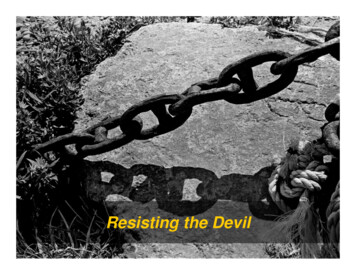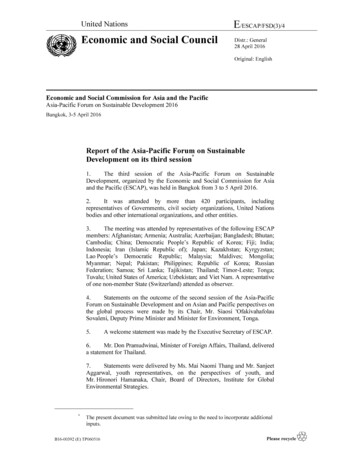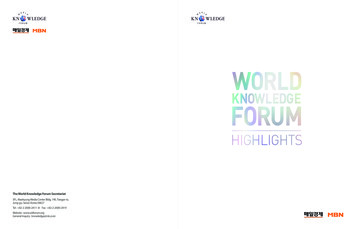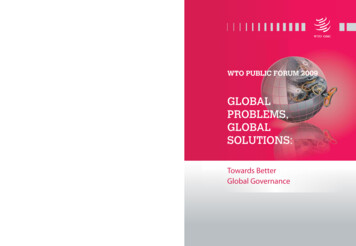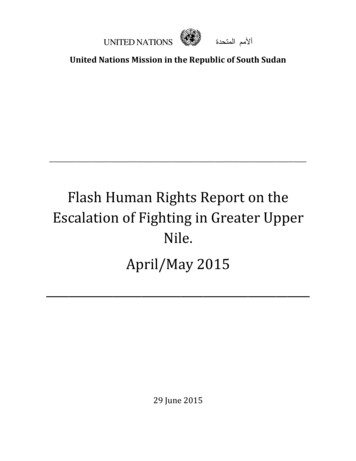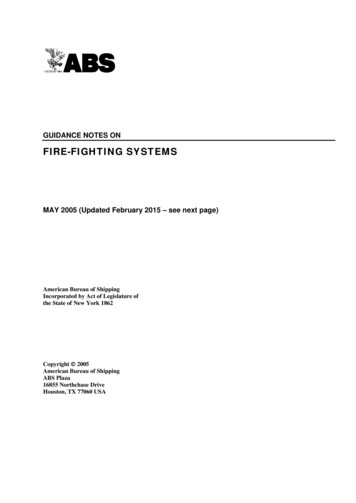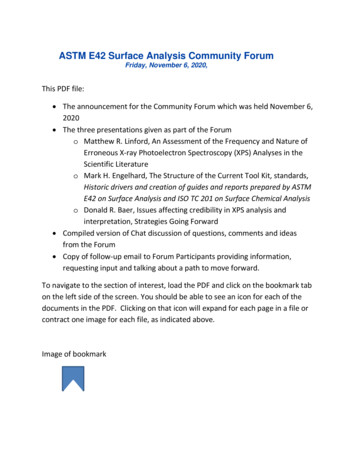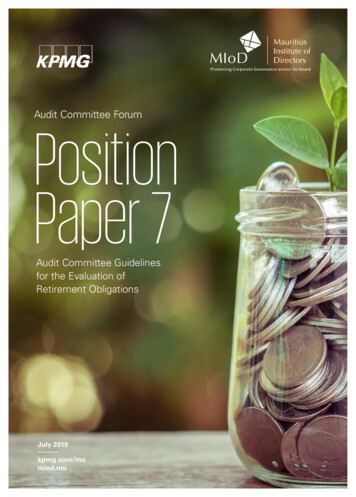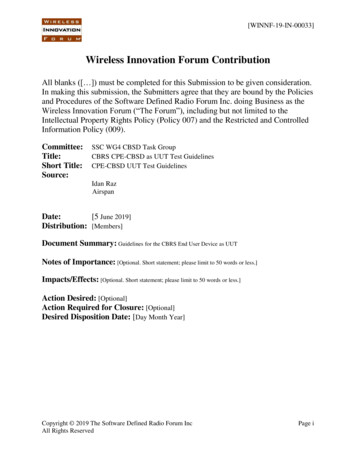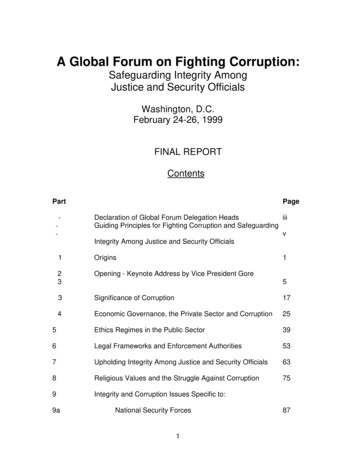
Transcription
A Global Forum on Fighting Corruption:Safeguarding Integrity AmongJustice and Security OfficialsWashington, D.C.February 24-26, 1999FINAL REPORTContentsPartPage-Declaration of Global Forum Delegation HeadsiiiGuiding Principles for Fighting Corruption and SafeguardingvIntegrity Among Justice and Security Officials1Origins23Opening - Keynote Address by Vice President Gore3Significance of Corruption174Economic Governance, the Private Sector and Corruption255Ethics Regimes in the Public Sector396Legal Frameworks and Enforcement Authorities537Upholding Integrity Among Justice and Security Officials638Religious Values and the Struggle Against Corruption759Integrity and Corruption Issues Specific to:-9a15National Security Forces187
9bOther Security Forces939cCustoms Services1019dFinancial Regulatory Officials1039eProcurement Officials1079fJudiciary11110Global and Regional Anticorruption Frameworks11311Internal Oversight12112Non-Governmental Organizations13513Strategies for Making Corruption Visible13714Roundtable Discussion by Delegation Heads15115Closing Address by Vice President Gore16316Other Events16717Synthesis17518Acknowledgements17719List of Participants18120Contents of Appendix to the Final Report19721Index2072
Global Forum on Fight Corruption:Safeguarding Integrity Among Justice and Security OfficialsDECLARATIONFor the past three days, we participants from 90 governments, gatheredhere in Washington D.C. at the invitation of U.S. Vice President Al Gore, haveworked intensely to examine the causes of corruption and practices that areeffective to prevent or fight it. Elected officials, ministers responsible for securityand justice, experts in public ethics and anti-corruption from every region of theworld were joined by distinguished academics and lay and clerical figures frommany of the world’s great religions.We are on the eve of a new millennium. As never before, the world’speople need officials of their governments to serve them with unquestionedintegrity. Corruption of justice and security officials betrays their trust.Corruption cannot long co-exist with democracy and the rule of law. Corruptionmisallocates resources, hurts the poor, and weakens economies and societies.After three days of serious, searching work, we emerge persuaded thatcorruption is not inevitable. It is made by actions of men and women.Governments and their peoples can act and can succeed in our struggle againstit, if only we have the will and the determination to do so.We have considered and shared with one another many practices thathelp control or punish corruption in public office. We are conscious of the effortsbeing undertaken in many regional bodies, such as the Organization of AmericanStates, the Council of Europe, the Organization of Economic Cooperation andDevelopment, the European Union, and the Global Coalition for Africa. We callon all of our governments to cooperate in appropriate regional and global bodiesto rededicate themselves to adopt effective anti-corruption principles andpractices, and to create ways to assist each other through mutual evaluation.We feel a common urgency to act. We also continue the dialogue wehave begun in this forum. We will gather again in a second Global Forum onFighting Corruption, to be held next in the Netherlands, and we proposethereafter an annual Global Ministerial forum on fighting corruption. Protectingour citizens from corruption among their justice and security officials must be oneof the most basic responsibilities of our governments and of us as individualofficials of our governments.We are one in our personal commitment to this end.3
February 26, 19994
GUIDING PRINCIPLES FOR FIGHTINGCORRUPTION AND SAFEGUARDING INTEGRITYAMONG JUSTICE AND SECURITY OFFICIALSNOTE: Annotated Version. In this document, each of the practices is followed bya parenthetical letter or letters indicating from which source or sources thestatement of the practice was derived, including agreements, documents andother sources in existing international literature or experience regardingcorruption, public integrity or related matters of crime. Sources are identified inthe listing at the end of this document.Corruption, dishonesty and unethical behavior among public officialsrepresent serious threats to the basic principles and values of government,undermining public confidence in democracy and threatening to erode the rule oflaw. The aim of these Guiding Principles is to promote public trust in the integrityof officials within the public sector by preventing, detecting, and prosecuting orsanctioning official corruption and unlawful dishonest, or unethical behavior.It is anticipated that these guiding principles will be implemented by eachgovernment in a manner appropriately tailored to the political, legal, economicand cultural circumstances of the country. Due to the different functions andmissions of different judicial, justice, and security officials, not all effectivepractices are applicable in all categories. This document does not prescribe aspecific solution to corruption among justice and security officials, but ratheroffers a list of potentially effective corruption-fighting practices for consideration.The list of practices, which may apply to other sectors of government in additionto justice and security officials, is intended to help guide and assist governmentsin developing effective and appropriate means to best achieve their specificpublic integrity ends.1. Establish and maintain systems of government hiring of justice andsecurity officials that assure openness, equity and efficiency andpromote hiring of individuals of the highest levels of competence andintegrity.Effective practices include: Systems for equitable compensation adequate to sustain appropriatelivelihood without corruption (J, N); Systems for open and merit based hiring and promotion with objectivestandards (C,I);5
Systems which provide assurance of a dignified retirement withoutrecourse to corruption (J, N); Systems for thorough screening of all employees for sensitive positions(N); Systems for probationary periods after initial hiring (N); Systems which integrate principles of human rights with effectivemeasures for preventing and detecting corruption. (N).2. Adopt public management measures that affirmatively promote anduphold the integrity of justice and security officials.Effective practices include: An impartial and specialized institution of government to administer ethicalcodes of conduct (C, D, I, J); Training and counseling of officials to ensure proper understanding of theirresponsibilities and the ethical rules governing their activities as well astheir own professionalism and competence (C ); Training addressed to issues of brutality and other civil rights violationsthat often correlate with corrupt activity among justice and security officials(N, substantial international literature relating to human rights issues); Managerial mechanisms that enforce ethical and administrative standardsof conduct (B, D, H, I, J); Systems for recognizing employees who exhibit high personal integrity orcontribute to the anti-corruption objectives of their institution (N); Personnel systems that include regular rotation of assignments to reduceinsularity that fosters corruption (B,D, I, J, N); Systems to provide appropriate oversight of discretionary decisions and ofpersonnel with authority to make discretionary decisions (B, D, I, J, N); Systems that hold supervisors accountable for corruption control (B, D, I,J, N);6
Positive leadership which actively practices and promotes the higheststandards of integrity and demonstrates a commitment to prevent anddetect corruption, dishonesty and unethical behavior (N); Systems for promoting the understanding and application of ethical valuesand the standards of conduct required (N); Mechanisms to support officials in the public sector where there isevidence that they have been unfairly or falsely accused. (N)3. Establish ethical and administrative codes of conduct that proscribeconflicts of interest, ensure the proper use of public resources, andpromote the highest levels of professionalism and integrity.Effective practices include: Prohibitions or restrictions governing officials participating in officialmatters in which they have a substantial direct or indirect financial interest(I, N); Prohibitions or restrictions against officials participating in matters in whichpersons or entities with whom they are negotiating for employment have afinancial interest (I, N); Limitations on activities of former officials in representing private orpersonal interests before their former governmental agency ordepartment, such as prohibiting the involvement of such officials in casesfor which former officials were personally responsible, representingprivate interests by their improper use of influence upon their formergovernmental agency or department, or using confidential knowledge orinformation gained during their previous employment as an official in thepublic sector (N); Prohibitions and limitations on the receipt of gifts or other advantages (F, I,N); Prohibitions on improper personal use of government property andresources (C, F, N).4. Establish criminal laws and sanctions effectively prohibiting bribery,misuse of public property, and other improper uses of public office forprivate gain.Effective practices include:7
Laws criminalizing the giving, offer or promise by any party (“active”) andthe receipt or solicitation by any official (“passive”) of a bribe, andcriminalizing or sanctioning the giving or receiving of an improper gratuityor improper gift. (A, C, E, F, G, I, others). Laws criminalizing or sanctioning the illegal use by officials of governmentinformation (C, F); Laws affirming that all justice and security officials have a duty to providehonest services to the public and criminalizing or sanctioning breaches ofthat duty (I). Laws criminalizing improper use of official power or position, either to thedetriment of the government or for personal enrichment.5. Adopt laws, management practices and auditing procedures that makecorruption more visible and thereby promote the detection and reporting ofcorrupt activity.Effective practices include: Systems to promote transparency, such as through disclosing the financialcircumstances of senior officials. (C, I, J). Measures and systems to ensure that officials report acts of corruption,and to protect the safety, livelihood and professional situation of thosewho do, including protection of their identities to the extent possible underthe law (F, I); Measures and systems that protect private citizens who, in good faith,report acts of official corruption (C, D, E, F, I, L); Government revenue collection systems that deter corruption, in particularby denying tax deductibility for bribes or other expenses linked tocorruption offenses. (B, C, D, J); Bodies responsible for preventing, detecting, and eradicating corruption,and for punishing or disciplining corrupt officials, such as independentombudsmen, inspectors general, or other bodies responsible for receivingand investigating allegations of corruption (B, D, I); Appropriate auditing procedures applicable to public administration andthe public sector (D, I, J);8
Appropriately transparent procedures for public procurement that promotefair competition and deter corrupt activity (B, C, D, F, J). Systems for conducting regular threat assessments on corrupt activity (N).6. Provide criminal investigators and prosecutors sufficient andappropriate powers and resources to effectively uncover and prosecutecorruption crimes.Effective practices include: Empowering courts or other competent authorities to order that bank,financial or commercial records be made available or be seized, and thatbank secrecy not prevent such availability or seizure (C, E, J, K, L); Authorizing use under accountable legal supervision of wiretaps or otherinterception of electronic communication, or recording devices, ininvestigation of corruption offenses (E, F, J, L); Authorizing, where appropriate, the admissibility of electronic or otherrecorded evidence in criminal proceedings relating to corruption offenses(E, F, J, L); Employing where appropriate systems whereby persons charged withcorruption or other corruption-related criminal offenses may secure moreadvantageous treatment in recognition of assisting in the disclosure andprosecution of corruption offenses (E, F, K, L); The development of appropriate information gathering mechanisms toprevent, detect and deter official corruption and dishonesty (N).7. Ensure that investigators, prosecutors and judicial personnel are sufficientlyimpartial to fairly and effectively enforce laws against corruption.Effective practices include: Personnel systems to attract and retain high quality corruptioninvestigators (N); Systems to promote the specialization and professionalization ofpersons and organizations in charge of fighting corruption (D, E, J); Establishment of an independent mechanism within judicial andsecurity agencies with the duty to investigate corruption allegations,9
and with the power to compel statements and obtain documentsfrom all agency personnel (N); Codes of conduct or other measures that require corruptioninvestigators, prosecutors, and judges to recuse themselves fromany case in which their political, financial or personal interests mightreasonably raise questions about their ability to be impartial. (N); Systems that allow for the appointment, where appropriate, ofspecial authorities or commissions to handle or oversee corruptioninvestigations and prosecutions (N); Standards governing the initiation of corruption investigations toensure that public officials are not targeted for investigation forpolitical reasons (N).8. Ensure that criminal and civil law provide for sanctions and remedies that aresufficient to effectively and appropriately deter corrupt activity.Effective practices include: Laws providing substantial criminal penalties for the laundering ofthe proceeds of public corruption violations (A, C, E, J, L); Laws providing for substantial incarceration and appropriateforfeiture of assets as a potential penalty for serious corruptionoffenses (A, C, E, G, others); Provisions to support and protect whistleblowers and aggrievedprivate parties (B, D, J).9. Ensure that the general public and the media have freedom to receive andimpart information on corruption matters, subject only to limitations orrestrictions which are necessary in a democratic society.Effective practices include: Establishing public reporting requirements for justice and securityagencies that include disclosure about efforts to promote integrityand combat corruption (D, H, I, J); Enacting laws or other measures providing a meaningful public rightof access to information about corrupt activity and corruptioncontrol activities (D, H, I, J).10
10. Develop to the widest extent possible international cooperation in all areas ofthe fight against corruption.Effective practices include: Systems for swift and effective extradition so that corrupt publicofficials can face judicial process (A, C, E, G, L, others); Systems to enhance international legal assistance to governmentsseeking to investigate and prosecute corruption violations (A, C, E,G, L, others); Systems to facilitate and accelerate international seizure andrepatriation of forfeitable assets associated with corruptionviolations (A, C, E, F, G, L, others) Inclusion of provisions on combating corruption in appropriatebilateral and multilateral instruments (N).11. Promote, encourage and support continued research and public discussion inall aspects of the issue of upholding integrity and preventing corruptionamong justice and security officials and other public officials whoseresponsibilities relate to upholding the rule of law.Effective practices include: Appointment of independent commissions or other bodies to studyand report on the effectiveness of efforts to combat corruption inparticular agencies involved in justice and security matters (N); Supporting the efforts of multilateral and non-governmentalorganizations to promote public integrity and prevent corruption (N); Promoting efforts to educate the public about the dangers ofcorruption and the importance of general public involvement ingovernment efforts to control corrupt activity (C, I, J, N).12. Encourage activities of regional and other multilateral organizations in anticorruption efforts.Effective practices include:11
Becoming parties, as appropriate, to applicable multilateral legalinstruments containing provisions to address corruption; Cooperating in carrying out programs of systematic follow-up tomonitor and promote the full implementation of appropriatemeasures to combat corruption, through mutual assessment bygovernments of their legal and practical measures to combatcorruption, as established by pertinent international agreements. (A,E, L, M); Participating actively in future international conferences onpromoting integrity and combating corruption among justice andsecurity officials.12
Listing of SourcesA.OECD Convention on Combatting Bribery of Foreign Public Officials inInternational Business Transactions.B.OECD Council Recommendations Against Corruption, May 1997.C.OAS Inter-American Convention Against Corruption.D.Council of Europe Committee of Ministers 20 Recommendations AgainstCorruption, November 1997E.Council of Europe Criminal Law Convention on Corruption.F.Council of Europe Conclusions of the Second European Conference ofSpecialized Services in the Fight Against Corruption, October 1997G.European Union Convention on Corruption of EU or Member Officials,May 1997H.European Parliament Resolution on Combating Corruption in Europe,December 1995I.United Nations Secretariat Manual: Practical Measures AgainstCorruption, July 1990J.United Nations Commission on Crime Prevention and Criminal Justice:Report of Expert Group on Action Against Corruption and Bribery, March1997K.United Nations Convention Against Illicit Trafficking in Narcotic Drugs orPsychotropic SubstancesL.United Nations Draft Convention Against Transnational Organized CrimeM.Financial Action Task Force, 40 RecommendationsN.Observed experience of governments (“common sense”).1. Origins13
a. Origins of the Global Forum on Fighting CorruptionIn 1997, recognizing the dramatic growth of transnational crime in today’sinterconnected world, President Clinton called on the Departments of Justice,State and the Treasury to develop and implement a comprehensive nationalstrategy to fight international crime and reduce its impact on Americans. In May1998, the President approved and published the first United States GovernmentInternational Crime Control Strategy. That Strategy had the purpose of definingthe specific goals and objectives which, if achieved, would lead to a more secureand law-abiding world in which America and Americans can thrive. One of theobjectives defined to implement its seventh Goal (“Foster InternationalCooperation and the Rule of Law”) called for the United States Government to:Strengthen the rule of law as the foundation fordemocratic government and free markets in order toreduce societies’ vulnerability to criminal exploitation.The responsibilities of the public order, security and justice officials ofgovernments who uphold the rule of law are fundamental to the operation ofdemocratic institutions and free markets. Corruption of officials responsible forthe rule of law thus impairs the institutions of government itself, and erodes thepotential effectiveness of anticorruption measures in other aspects of a society.The International Crime Control Strategy therefore identified the question ofcorruption among justice and security officials of governments as one of centralsignificance to the rule of law. It recognized that corruption among such officialshas existed throughout history. It took account of the fact that to effectivelycombat such corruption, it is necessary to identify and analyze the institutionalfactors that promote integrity among public officials, or deter corruption byidentifying and punishing perpetrators of corrupt acts. It recognized that unlikethe issue of bribery in commercial transactions, corruption affecting justice andsecurity officials has been less subject to intensive discussion, analysis andpolicy definition in dialog among governments. It recognized that corruptionamong the officials of a government that are responsible to maintain the rule oflaw cannot be “solved”, but can be controlled.The International Crime Control Strategy defined ten specific initiatives tofurther United States Government efforts against international crime. One ofthose ten initiatives was that:The United States will call for an internationalconference within the next six months to focus on thedevelopment of model approaches for upholdingintegrity among key justice and security officials. Thisinternational conference, which the President hasasked Vice President Gore to organize, wouldexamine real life situations relating to the standards of14
integrity among justice and security officials worldwideand then prepare appropriate policyrecommendations.Justice and security officials include all those whohave a key role in maintaining the rule of law, whetherthey are police, border officials, military personnel,prosecutors or judges. The conference would collectbasic facts on compensation, assess corruptinginfluences, review standards of ethical conduct, andtake stock of ongoing, national, regional and globalinitiatives – all with a view to determining whichapproaches to upholding integrity work, which do not,and what new approaches might be developed.In June 1998, almost simultaneously with the approval of the U.S.strategy, the Heads of Government of the G8 group, meeting at the Summit inBirmingham, England, held an extensive discussion of the relationship betweenserious crime and corruption. Based on that discussion, the principals draftedand added to their Communiqué a new sentence. This directed the G8 SeniorExperts on Transnational Crime (“Lyon Group”) to “explore ways of combatingofficial corruption arising from the large flows of criminal money.” TheCommuniqué directed that the Experts report back on their activities to the nextmeeting of the G8 Summit, to be held at Koln, Germany, in June 1999. TheUnited States consulted with other members of the G8 at several meetings of theLyon Group regarding preparations for the international conference, andconsiders this conference to have represented one significant aspect of theresponse to this mandate.In December 1998, Vice President Gore issued his call for the conference,officially designated “Global Forum on Fighting Corruption: Safeguarding IntegrityAmong Justice and Security Officials.” He sent messages of invitation to over 80governments to send participants. Response to the Vice President’s invitationswas highly positive; several governments were represented by officials of theirembassies in Washington, but no invited government failed to participate. Acomplete list of foreign participants at the Global Forum is provided in part 19below. Responses indicated that governments saw this initiative to begininternational discussion on the specific issue of corruption among justice andsecurity officials as opening a new aspect of the wide problem of corruption.Moreover, this is an aspect of fundamental significance to all governments,whose most basic purpose is to maintain the rule of law.b. Origin of the Guiding Principles for FightingCorruption and Safeguarding Integrity Among Justice andSecurity Officials15
Corruption, dishonesty and unethical behavior among public officialsrepresent serious threats to the basic principles and values of government,undermining public confidence in democracy and threatening to erode the rule oflaw. This fact has become increasingly recognized in a number of global andregional fora, and preventing or punishing corruption among these groups ofgovernment officials has been addressed in a growing number of internationalagreements, resolutions, formal recommendations, expert group evaluations andsimilar documents. In order to assist participants to prepare for the GlobalForum, in the fall of 1998 the United States Government undertook an analysis ofthis existing international literature on this subject. The most pertinentagreements and other documents were assembled to become the Source Bookthat was prepared and distributed to all Global Forum participants. The full textof the Source Book may be found in the Appendix.In analysis of these documents, it became evident that certain practicesfor preventing or fighting corruption among justice and security officials havebecome recognized as proven to be effective in many cases. Such practicesdivide themselves into groups that implement a more limited number of generalprinciples. Taken together, a regime of practices that effectively implement thoseprinciples will offer an effective effort to prevent or combat corruption amongjustice and security officials. Each government implements these guidingprinciples differently, in a manner that becomes appropriately tailored to thepolitical, legal, economic and cultural circumstances of each country. Due to thedifferent functions and missions of different judicial, justice and security officials,not all practices for preventing or fighting corruption are applicable in allcategories. There is no specific solution to corruption among justice and securityofficials. Rather, there is a number of potentially effective corruption-fightingpractices, from which governments may derive solutions that appropriately applygeneral guiding principles to their specific requirements.This list of practices identified in existing international agreements,recommendations and other documents, or based on the observed experience ofgovernments, and the twelve general principles that these practices may serve,were assembled into the working document "Guiding Principles for FightingCorruption and Safeguarding Integrity Among Justice and Security Officials."That document, which is reproduced in this Final Report above, was provided toall participants in the Global Forum, as a convenient compilation of concepts thatare diversely expressed in the number of differing documents contained in theSource Book. This list of practices, which may apply also to other sectors ofgovernment in addition to justice and security officials, is intended to help guideand assist governments in developing or improving effective and appropriatemeans to best achieve their specific public integrity ends.16
2. Opening - Keynote Addressby Vice President Al GoreMadeline K. AlbrightSecretary of StateUnited States of AmericaThe Global Forum on Fighting Corruption: Safeguarding Integrity AmongJustice and Security Officials formally began at 9:00 a.m. Wednesday, February24, 1999 in the Loy Henderson International Conference Room, Department ofState, Washington, D.C. A list of participants at the Global Forum is provided inpart 19 of this Final Report. A copy of the Global Forum program, listing allprepared presentations, is contained in the Appendix to this Report.The Global Forum was called to order and opened with introductoryremarks by United States Secretary of State Madeline K. Albright. The full text ofher remarks may be found in the Appendix.She welcomed the Vice President and other participants in the GlobalForum to the Department of State. She observed that it was fitting that for thisGlobal Forum on Fighting Corruption, a truly global audience had assembled.The surprising breadth of this conference reflected a fundamental understandingthat corruption was not merely a private breach of ethics, but a matter ofprofound political and social consequence, especially for efforts to strengthendemocratic governments. Some might suggest that corruption is endemic tohuman nature and that it was futile to attempt to fight it. The truth was that therewas in fact progress. The OECD Convention on Bribery of Foreign PublicOfficials in International Commercial Transactions entered into force that month.The Inter-American Convention Against Corruption had been signed by almostevery country in the Western Hemisphere, and deserved prompt approval by theUnited States Senate. The Council of Europe’s Criminal Law Convention AgainstCorruption opened for signature in January. African countries were discussing aregional anticorruption regime. Individual countries, government institutions,even local governments, from New Orleans, Louisiana to Palermo, Sicily, werestrengthening justice systems and building as several participants had properlydescribed as a "culture of lawfulness."These advances of recent years reflected several important principles.One was that action against corruption must address both demand and supply.This meant not only making bribery illegal, but ensuring that officials were madeless susceptible to bribes by paying them sufficiently. A second importantprinciple was accountability. Officials that were adequately paid must know thatcorruption would result in their dismissal, and that serious or repeatedtransgressions could bring imprisonment. Third, it was necessary to assure17
clarity in teaching and maintaining the distinction between public duties andprivate preferences. People everywhere must understand that corruption is notcapitalism’s natural product, but its perversion. Underlying everything was thefundamental principle of establishing and reinforcing the rule of law.All that might be done to prevent corruption by stronger laws and greateraccountability, however, would be vitiated if corrupt officials or businesspersonsfaced compromised police, or prosecutors or judges that could be bribed.Pursuing a culture of lawfulness neces
Corruption, dishonesty and unethical behavior among public officials represent serious threats to the basic principles and values of government, undermining public confidence in democracy and threatening to erode the rule of law. The aim of these Guiding Principles is to promote public trust in the integrity
